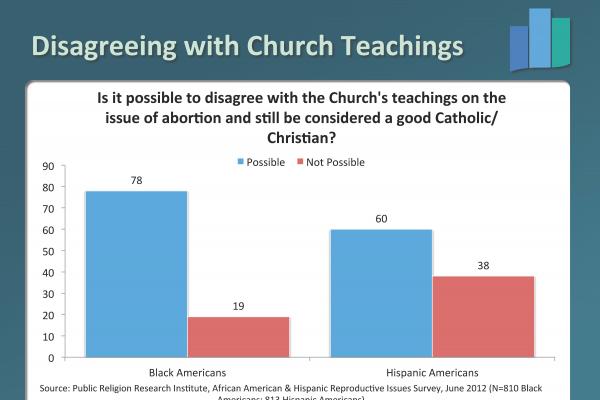The influence of clergy in swaying their congregants' attitudes about moral issues like abortion and contraception access is dwindling, according to a new study.
The Religion, Values, and Experiences: Black and Hispanic American Attitudes on Abortion and Reproductive Issues survey, conducted by the Public Religion Research Institute, shows that there continues to be a disconnect in personal, moral belief and feelings about public policy.
"What they're hearing at church is not the big mover on attitudes of legality of abortion," Robert Jones, PRRI CEO, said.
While 51 percent of black Americans believe abortion is morally wrong, 67 percent say it should be legal in all or most cases.
"I really think that freedom of choice is probably one of the most precious components of what it means to be a Christian. Blacks have been quite possessive and reflective of this fact," said Dr. Stacy Floyd-Thomas, associate professor of Ethics and Society at Vanderbilt University's Divinity School. "… You do have the majority saying that they might see it as a sin or they are against it, but you still have the right."
Both groups believe it is possible to disagree with church teaching and be a good Catholic or good Christian. Jones pointed to the growing trend of personal versus external focus. Previous surveys have shown that attitudes about religion are mostly influenced by people's own beliefs and behaviors rather than institutional doctrine.
Also changing is how society self-identifies. Most Americans no longer say they are solidly "pro-life" or "pro-choice" — rather they say both terms describe them well. While 71 percent of black Americans and 77 percent of Hispanic Americans say "pro-life" describes them well, 75 and 72 percent, respectively, also identify with the term "pro-choice."
According to Jones, it's a more obvious phenomenon among black and Hispanic Americans than the general public. A possible explanation could have to do with a somewhat gray area of the circumstances women should be able to obtain an abortion.
Overwhelmingly — 80 percent and 68 percent — of black and Hispanic Americans believe that women who were raped should have access to an abortion; majorities believe that if there is a strong chance of serious defect in the baby, women should be allowed.
But regardless of each group's feelings on abortion, the issue falls pretty low on the scale of priorities. Only 17 percent of black Americans and 30 percent of Hispanic Americans cite abortion as a critical issue facing the country. Same-sex marriage came in similarly. Topping the list are the economy, education, the deficit, the growing gap between rich and poor, and — mostly for Hispanic Americans — immigration.
Sandi Villarreal is Associate Web Editor for Sojourners. You can follow her on Twitter @Sandi.
Got something to say about what you're reading? We value your feedback!
